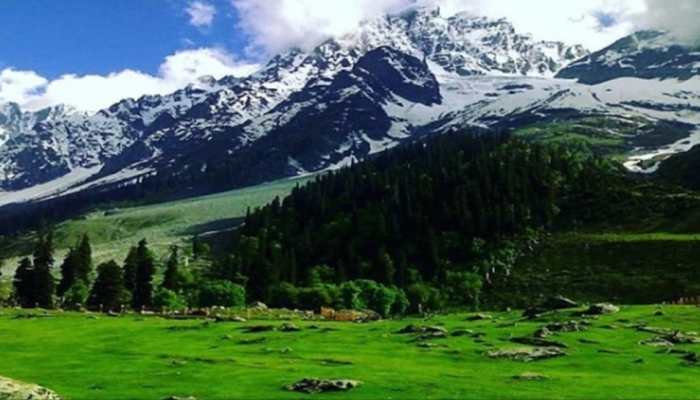Indus Water Treaty Suspension Sparks Hope for Resolving Kashmir’s Water Crisis
The suspension of the Indus water treaty has raised hopes in Kashmir for addressing water shortages for agriculture and power, driven by climate change impacts like glacial retreat and erratic river flows. Kashmir for the suspension, with farmers and residents hoping for a “fair share” of water to combat the crisis.
Trending Photos
) File Photo (ANI)
File Photo (ANI) New Delhi: The suspension of the Indus water treaty has raised hopes in Kashmir for addressing water shortages for agriculture and power, driven by climate change impacts like glacial retreat and erratic river flows. Kashmir for the suspension, with farmers and residents hoping for a “fair share” of water to combat the crisis.
Kashmir is facing a deepening water crisis due to climate change, with hotter summers, early snowmelt, and reduced rainfall shrinking water availability. About 70% of Kashmir’s population depends on farming, relying on snowmelt for irrigation. Erratic weather patterns, early snowmelt, and shrinking glaciers have reduced water availability, with rivers like the Jhelum seeing up to 30% lower flows in dry seasons compared to historical averages. Rapid melting of Himalayan glaciers, supplying 60-70% of the Indus River’s summer flow, is melting 65% faster than in previous decades, causing short-term increases in water flow but threatening long-term scarcity. This exacerbates Kashmir’s water crisis, as less snowfall and its early melting disrupts irrigation. But IMD also believes suspension of the Indus water treaty will help the whole of Jammu and Kashmir.
Mukhtar Ahmad IMD Director Kashmir said, “ In Jammu and Kashmir, sufficient snowfall is not happening, and average temperatures have increased from .5 to 7.8 had increased and its impact is seen in Kashmir there is heatwave and temperatures also touched 37.4, which is the highest in the last 70 years in Kashmir. Glacier melting is happening at a rapid pace because temperatures are rising in the Himalayan region, and glaciers are not getting recharged; they are receding. More glaciers are under heavy stress, and temperatures in early summers are high. Earlier, when temperatures went above 30, there was an auto-cut system, and rain used to happen that auto-cut no longer exists now.”
The Agriculture and Horticulture Department in Jammu and Kashmir has acknowledged that water deficits, worsened by climate change, have significantly impacted crop production as per data, paddy cultivation has declined from 162,000 hectares in 110,000 hectares 2012 to in 2023, and there are 50% losses in apple orchards in Kashmir, prompting farmers to shift to less water-intensive crops. Departments are also encouraging farmers to transition from water-heavy crops like paddy to drought-resistant and less water-dependent crops.
Sartaj Ahmad, Director of Agriculture, said, "It’s global warming and we are part of it, and its effect is seen here also. Temperatures are expected to be very hot, and we are preparing for it for the climate slot, agriculture, and those crops that need less water. This is a possibility that we can come out of this situation. The water which will be available by this suspension of this water treaty will be significantly utilized for the development of agriculture for the whole of Jammu and Kashmir.”
In those crises, the suspension of the Indus Waters Treaty by India following a terror attack in Pahalgam has sparked optimism among Kashmiris, mostly farmers, for improved access to water for agriculture and hydropower, amid growing water shortages exacerbated by global warming. Locals, including farmers and residents, now feel that Kashmiris will have access to their rivers. The suspension has raised hopes that India could redirect water from those rivers for local use in Jammu and Kashmir, potentially alleviating shortages for agriculture and boosting hydropower projects. About 70% of Kashmir’s population depends on farming, relying on the Jhelum, Chenab, and the Indus River for irrigation. Kashmiri farmers hope India will redirect more water from the Jhelum and Chenab for irrigation. Currently, only 15-20% of the Jhelum’s flow is used in Kashmir due to treaty restrictions, with most water flowing to Pakistan. Farmers now see potential for new canals or reservoirs to boost irrigation, potentially increasing cultivable land by 10-15%.
Rashid Rahil Member of farmers association Kashmir expert said, "The farmers of Kashmir from last many years had gone through heavy losses because of dryness if the water is used for them a good crop will be seen and we can hope that new power projects and power production will increase and which only will not help Jammu Kashmir but we supply electricity to many parts of country. Overall, we can say that suspension of the Indus Water Treaty will help the people of Kashmir.”
Suspension could allow India to expand power projects, addressing power shortages worsened by climate-induced low river flows during dry seasons, and can produce more power, which will end power crises in Jammu and Kashmir as well as in northern India. Besides, the Agricultural and Horticulture sector of Jammu and Kashmir will bloom more.
Stay informed on all the latest news, real-time breaking news updates, and follow all the important headlines in india news and world News on Zee News.
Live Tv



)
)
)
)
)
)
)
)
)
)
)
)
)
)
